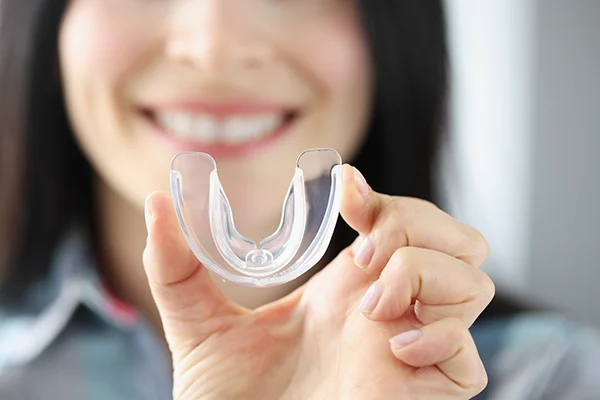Mouth Guard Nightguards prevent damage to the teeth. This is especially important for patients who clench or grind their teeth during sleep. This is called bruxism, a movement-related disorder in which you frequently gnash, grind, or clench your teeth. If you have bruxism you may unconsciously clench your teeth when awake, or clench and grind your teeth during sleep (sleep bruxism). In mild cases, treatment may not be necessary. Those who suffer from severe and frequent bruxism can develop jaw disorders, tooth damage, and other issues. Nightguards prevent damage to the teeth. This is especially important for patients who clench or grind their teeth during sleep. This is called bruxism, a movement-related disorder in which you frequently gnash, grind, or clench your teeth. If you have bruxism you may unconsciously clench your teeth when awake, or clench and grind your teeth during sleep (sleep bruxism). In mild cases, treatment may not be necessary. Those who suffer from severe and frequent bruxism can develop jaw disorders, tooth damage, and other issues. Mouthguards can vary in quality, proportion, and material depending on their purpose. If you suffer from bruxism, it is important that the issue is treated correctly. Using the wrong type of mouthguard can make symptoms worse. Schedule a consultation with one of our dentists at Town Center Dental. We can assess your specific areas of risk and recommend what type of mouthguard is right for you. Relation Between Sleep Bruxism and Obstructive Sleep ApneaThere is often a correlation between sleep bruxism and obstructive sleep apnea (OSA). The relationship between sleep bruxism and OSA depends on the degree and severity of the OSA. Mild to moderate OSA is often associated with sleep bruxism. Certain conditions, such as diabetes, could be a new risk factor for sleep bruxism. Patients with certain medical conditions may be at an increased risk of developing OSA. In short, sleep bruxism can be triggered by sleep apnea as the brain's means of getting more oxygen during sleep. Studies show that wearing a night guard can potentially correct sleep apnea, and subsequently sleep bruxism. It is important to remember that home remedies to correct sleep apnea or bruxism, for example, buying an over-the-counter mouthguard, can be damaging in the long term potentially leading to misalignment of the teeth and jaw, and buildup of plaque. Risks of not using a nightguard during sleepSleep bruxism, left untreated, can lead to permanent damage to the layers of the teeth, wearing them down and flattening them. In severe cases, tooth grinding can expose the nerve of the tooth causing sensitivity to temperature, and severe tooth pain. Tooth grinding can also lead to cracked teeth, loss of teeth, and recession of the gums. Clenching during sleep can cause pain in the jaw. You may feel soreness in the temples or tightness in the jaw upon waking. Over time, clenching or extended tension in the jaw can lead to temporomandibular joint disorder(TMJ). People who experience TMJ report symptoms of jaw pain, jaw popping, headaches, or face and neck pain. Do you need a nightguard?If you have concerns about bruxism for yourself or your child, visit us at Town Center Dental to consult with one of our dentists. If you are clenching or grinding your teeth, while awake or asleep, our dentist will be able to tell. The signs of wear from teeth clenching, gnashing, or grinding will be evident to the dentist during a dental exam. Our dentists, using information gathered from their assessment, will recommend the appropriate type of mouthguard for the risk areas related to your specific bruxism. Call us today to schedule a consultation: 636-273-5866. |